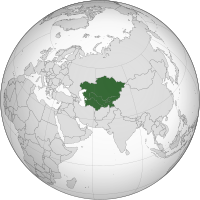
Photo from wikipedia
After decades of focusing almost exclusively on Western populations, psychology and other social sciences have at last begun to diversify their samples. Massive efforts have been made to compare cultures… Click to show full abstract
After decades of focusing almost exclusively on Western populations, psychology and other social sciences have at last begun to diversify their samples. Massive efforts have been made to compare cultures around the globe on basic psychological processes, and researchers have amassed much evidence for differences between “the West and the rest” (1⇓⇓–4). Indeed, social–psychological theories that were thought to be universal—from attribution theory to the structure of emotions to group dynamics and beyond—have been shown to vary considerably between Anglo-Americans and Asians among other cultural groups (5, 6). Yet, in the quest to understand differences across cultures, little attention has been given to the profound variation that exists within cultural groups. For example, lumping all Asian groups—from East, South, and central Asia—may not only miss important subcultural differences but may also neglect the distinct barriers that different subgroups face in attaining status and power in societies at large. The work by Lu et al. (7) in PNAS represents one of the first attempts to investigate not only important variation within Asian groups but also, the consequences of such variation for important societal outcomes—most notably, leadership attainment in US organizations. Lu et al. (7) begin their investigation by asking a simple question. Are Asian groups disadvantaged relative to whites when seeking leadership positions in the United States? At first glance, the question seems counterintuitive. Asians are typically seen as a “model minority”—with relatively high levels of academic and occupational attainment as compared with other racial minorities (8⇓–10). The much-publicized notion of “tiger parents” of Asian descent, popularized by Amy Chua (11), reinforces the expectation that Asians will be highly successful in society at large. Yet, recent research on what has now become known as the “bamboo ceiling” suggests that Asians are disadvantaged when … [↵][1]1To whom correspondence may be addressed. Email: mjgelfand{at}gmail.com. [1]: #xref-corresp-1-1
Journal Title: Proceedings of the National Academy of Sciences of the United States of America
Year Published: 2020
Link to full text (if available)
Share on Social Media: Sign Up to like & get
recommendations!